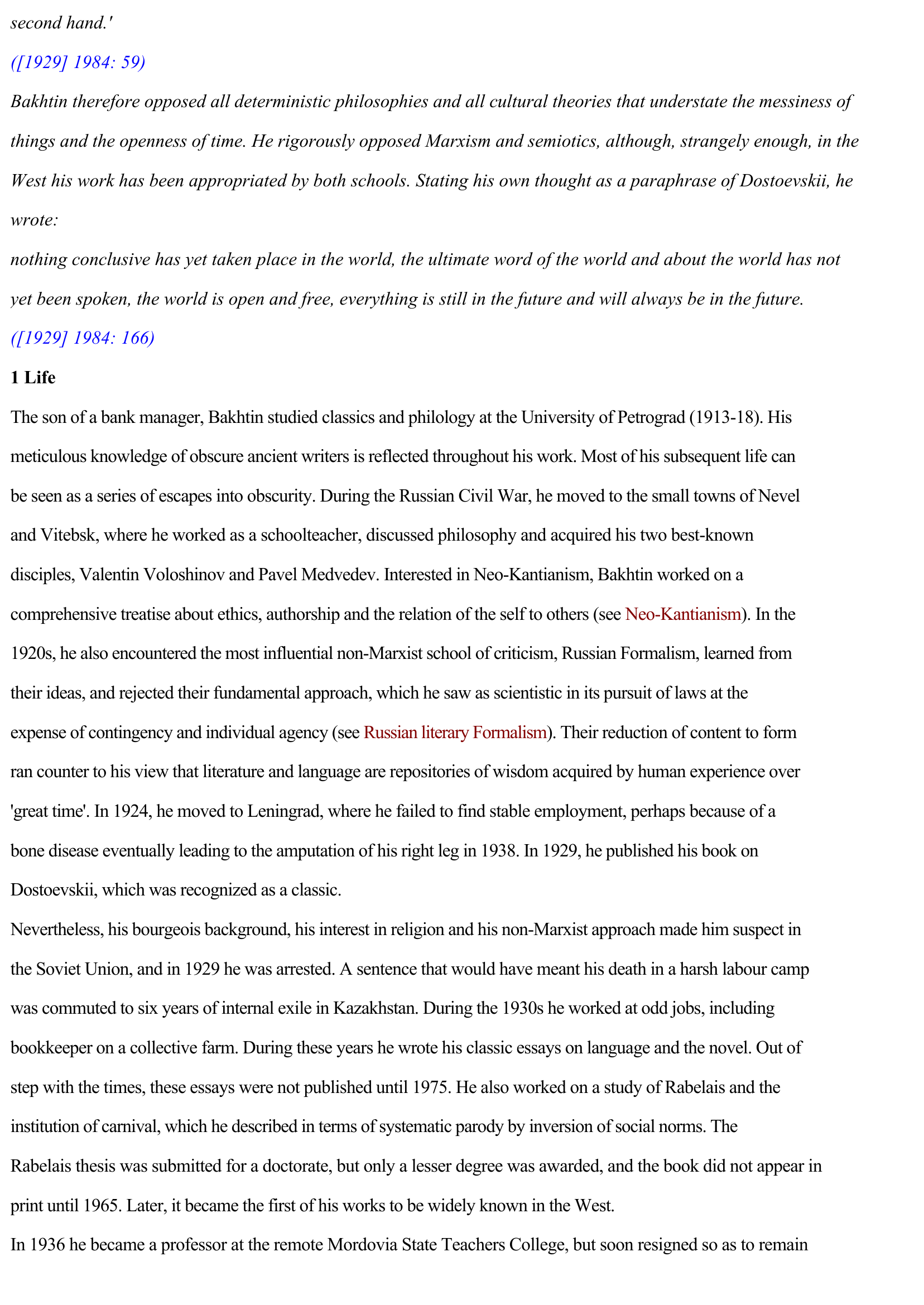Bakhtin, Mikhail Mikhailovich
Publié le 22/02/2012
Extrait du document
«
second hand. '
([1929] 1984: 59)
Bakhtin therefore opposed all deterministic philosophies and all cultural theories that understate the messiness of
things and the openness of time.
He rigorously opposed Marxism and semiotics, although, strangely enough, in the
West his work has been appropriated by both schools.
Stating his own thought as a paraphrase of Dostoevskii, he
wrote:
nothing conclusive has yet taken place in the world, the ultimate word of the world and about the world has not
yet been spoken, the world is open and free, everything is still in the future and will always be in the future.
([1929] 1984: 166)
1 Life
The son of a bank manager, Bakhtin studied classics and philology at the University of Petrograd (1913-18).
His
meticulous knowledge of obscure ancient writers is reflected throughout his work.
Most of his subsequent life can
be seen as a series of escapes into obscurity.
During the Russian Civil War, he moved to the small towns of Nevel
and Vitebsk, where he worked as a schoolteacher, discussed philosophy and acquired his two best-known
disciples, Valentin Voloshinov and Pavel Medvedev.
Interested in Neo-Kantianism, Bakhtin worked on a
comprehensive treatise about ethics, authorship and the relation of the self to others (see Neo-Kantianism ).
In the
1920s, he also encountered the most influential non-Marxist school of criticism, Russian Formalism, learned from
their ideas, and rejected their fundamental approach, which he saw as scientistic in its pursuit of laws at the
expense of contingency and individual agency (see Russian literary Formalism ).
Their reduction of content to form
ran counter to his view that literature and language are repositories of wisdom acquired by human experience over
'great time' .
In 1924, he moved to Leningrad, where he failed to find stable employment, perhaps because of a
bone disease eventually leading to the amputation of his right leg in 1938.
In 1929, he published his book on
Dostoevskii, which was recognized as a classic.
Nevertheless, his bourgeois background, his interest in religion and his non-Marxist approach made him suspect in
the Soviet Union, and in 1929 he was arrested.
A sentence that would have meant his death in a harsh labour camp
was commuted to six years of internal exile in Kazakhstan.
During the 1930s he worked at odd jobs, including
bookkeeper on a collective farm.
During these years he wrote his classic essays on language and the novel.
Out of
step with the times, these essays were not published until 1975.
He also worked on a study of Rabelais and the
institution of carnival, which he described in terms of systematic parody by inversion of social norms.
The
Rabelais thesis was submitted for a doctorate, but only a lesser degree was awarded, and the book did not appear in
print until 1965.
Later, it became the first of his works to be widely known in the West.
In 1936 he became a professor at the remote Mordovia State Teachers College, but soon resigned so as to remain.
»
↓↓↓ APERÇU DU DOCUMENT ↓↓↓
Liens utiles
- TERRES DÉFRICHÉES de Mikhail Cholokhov (résumé)
- CONTES ET RÉCITS Mikhail Zochtchenko (résumé)
- A L'EXTRÊME LIMITE Mikhail Petrovitch Artsybachev (résumé & analyse)
- DESTIN D’UN HOMME (Le) Mikhail Alexandrovitch Cholokhov (résumé)
- Le personnage d'ASTROV Mikhail Lvovitch

































